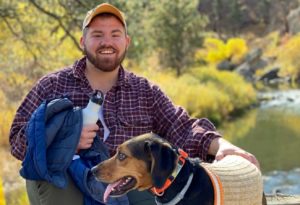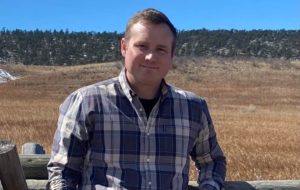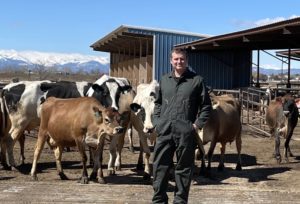ColoradoSPH offers its students countless opportunities to engage with all facets of public health and people within the CSU community. One of the many aspects is the realm of One Health, the study of the health connection between animals, people, and the shared environment. For Tyler Ward and Robert Fathke, this opportunity has brought them together to work on a meaningful project with northern Colorado dairy farmers.
Tyler Ward, an MPH student with a concentration in Animals, People, and the Environment, is set to graduate May 2022. Prior to graduate school, Ward received his A.A.S & B.S. in Veterinary Science Technology from SUNY Delhi and is also a Licensed Veterinary Technician. Ward worked as a student epidemiology researcher for his practicum and eventually stayed within this position after his practicum.

“I originally started this work for my practicum. I then stayed on part time during the fall semester. I grew up on a small farm in upstate NY and I also worked on two dairy farms during high school and have had some experience with dairy cattle nutrition research at Cornell University. Biosecurity on ruminant operations is little to none, so this project really interested me.”
Robert Fathke is a Ph.D. Candidate in Veterinary Epidemiology in the College of Veterinary Medicine and Biomedical Sciences at CSU. Prior to his doctoral studies at CSU, Fathke received his B.A. in Biology from Cornell University, his M.S. in Biology from James Madison University, his MPH in Global Health from The George Washington University, and DVM from VA-MD College of Veterinary Medicine.
Currently, Fathke is a Major in the US Army Veterinary Corps and is completing his Ph.D. through the Long Term Health Education and Training program while maintaining active duty status. His current Ph.D. work at CSU focusses on biosecurity on Front Range Colorado dairy farms.
“The long-term aim is to develop an integrated, or holistic farm biosecurity framework that includes elements of animal and human infectious disease prevention. The research aims to develop and validate a knowledge, attitudes, and practices (KAP) questionnaire focusing on prevention of infectious diseases in animals and workers on dairy farms. This includes endemic and transboundary animal diseases, zoonoses, and diseases like COVID-19 transmitted person-to-person. The research also aims to obtain dairy producer feedback on an existing quantitative farm biosecurity tool called BioCheck.UGent.”
As a student epidemiology researcher, Ward was assisting Fathke with the administration of his knowledge, attitude, and practices (KAP) studies in northern Colorado dairy farmers. He also was assisting with literature review and data collection for a systematic review on personal protective equipment (PPE) use of farmers globally.
When asked about his specific duties and roles within this position, Ward said,
“[I was] evaluating literature from a keyword search that was performed by Robert and an assisting librarian through CSU. I was going through the extracted publications and excluding works based on title and abstract. I was full text reading included publications and collecting data from relevant works. I was also assisting with the data entry and analysis of themes for the KAP studies that were completed by northern Colorado dairy farmers.”
Fathke originally engaged in this work at CSU through research advisors, Dr. Mo Salman and Dr. Sangeeta Rao, whose focus is in supporting US military officers to pursue graduate degrees in Veterinary Epidemiology related to infectious diseases. Dr. Rao has special interest in antimicrobial use and resistance, and biosecurity, and Dr. Salman sees the benefits of One Health concepts in addressing food systems and safety.

“Their interests in infectious disease epidemiology, biosecurity, animal population health, food security, and public health align with my own. I joined the US Army Veterinary Corps because I appreciate the Army values and enjoy contributing to teamwork leading to positive change.”
Fathke’s interest in One Health was sparked through college research that explored the intricacies of honeybees and their navigation.
“This project involved a great deal of fieldwork and provided me with the opportunity to observe honeybees in natural and experimental settings. Throughout my research with the bees, I grew to appreciate their biology, individual behavior, and very elegant group decision making processes. This experience instilled within me the relevance of population health and a systems approach to understanding our world, including the various animal, human, and environmental factors interacting within it. Honeybee populations, like livestock and people, are impacted by various infectious diseases. The fundamental concepts of biosecurity can be tailored to unique environments, whether those are apiaries or dairy farms.”
Fathke finds it most rewarding to see the application of the One Health concept develop over the years. He believes that since the start of the COVID-19 pandemic, different social, cultural, economic, legal, and technical factors surrounding One Health have become more apparent.
“Our current research has brought together experts and students in veterinary medicine, animals sciences, epidemiology, and occupational health. In addition to my efforts as a graduate student, the project has benefited from collaboration with two MPH students and one veterinary student. We are especially thankful for the participation of the 50 farm workers, managers, and owners across six conventional and organic dairy farms who dedicated time and energy to participate in this study.”

This project aligned closely with Ward’s own interests:
“I am very passionate about food animal production/medicine and One Health. I am very interested in working in areas of One Health that incorporate food animal production/medicine, food security, zoonoses, and sustainable animal agriculture.”
Ward finds that his interest in One Health comes from growing up on a small beef farm in New York. He believes that One Health manages to successfully incorporate all of his interests and that the Animals, People, and the Environment concentration was the perfect fit for him.
Another opportunity that Ward found to further his One Health interests is working with the University of Minnesota on his MPH capstone project.
“I am doing a review of published and grey literature to write a perspective paper on the Avian Influenza outbreak that occurred in Minnesota during the years 2014-2015. This was a very detrimental animal disease outbreak and understanding how it spread is critical to preventing future outbreaks.”
Ward has learned a multitude of important and valuable lessons during this experience.
“Systematic reviews, and literature reviews in general take time, patience, and are a lot of reading! But, they are so important in understanding trends, themes, and overarching levels of knowledge, and helps determine what research areas are missing.”
Within the broad umbrella of One Health, there are many opportunities for MPH students from all concentrations to explore the relationships between people, animals, and our environments, and how these interactions and systems impact health outcomes.
Written by Erica J Carter

